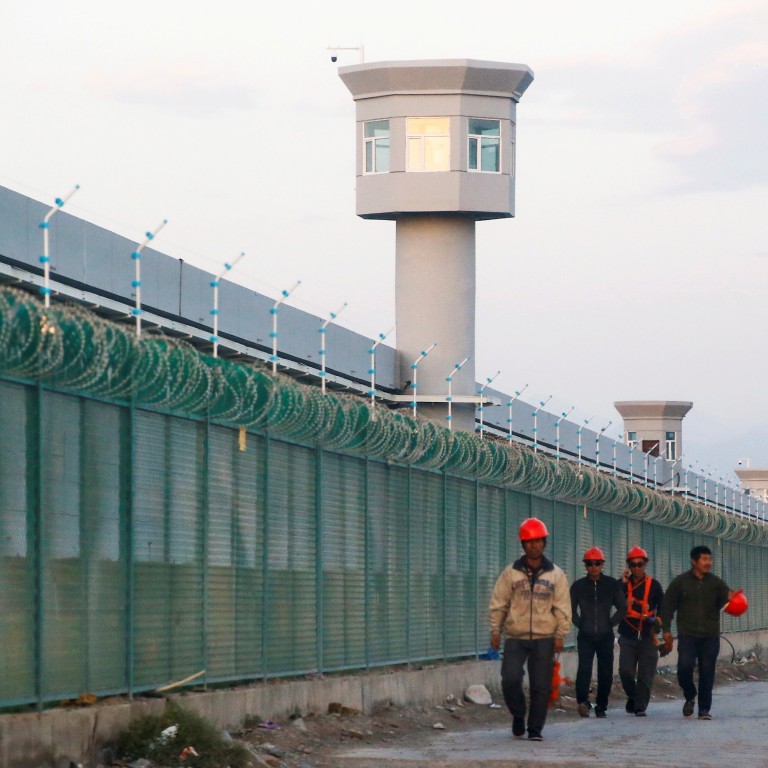
China invites EU leaders to ‘see real situation in Xinjiang’ amid claims of Uygur detention and abuse
- ‘We have always welcomed friends … to go to Xinjiang for a walk,’ says Chinese foreign ministry
- Previous foreign delegations to the home of Uygur minorities have been carefully controlled, limited in scope and labelled Chinese propaganda tools
Chinese foreign ministry spokesman Wang Wenbin said on Tuesday that the invitation had been extended during a virtual summit on Monday between Chinese President Xi Jinping and three EU leaders: European Council president Charles Michel, European Commission president Ursula von der Leyen and German Chancellor Angela Merkel.
“On Xinjiang-related issues, we have always welcomed friends from all over the world, including the European side, to go to Xinjiang for a walk and take a look to understand the real situation in Xinjiang, rather than hearsay and belief in deliberately fabricated lies,” Wang said.
“The EU and its member states’ envoys in China have expressed their hope to visit Xinjiang, and China has agreed and is willing to make arrangements.”
Citing anonymous sources in the Beijing diplomatic community, Reuters reported in November that the EU had rejected the offer because China had set unreasonable conditions – such as saying the delegation could not discuss human rights issues – and refused to allow a meeting with Xinjiang’s top official, Communist Party boss Chen Quanguo.
A previous request by 15 Western diplomats to meet Chen in late 2018 was condemned by Chinese foreign ministry spokeswoman Hua Chunying as “interference in China’s internal affairs with malicious intentions”.
Beijing has been the subject of international condemnation for the detention camps it operates tin Xinjiang.
China has only allowed limited access for carefully selected groups of journalists and diplomats to the area, most of them from non-Western countries.
The United States government has slammed these visits as “highly choreographed” while observers say those groups are being used as propaganda tools for Beijing.
“Previous visits to internment camps by ambassadors of Beijing-friendly countries were part of a rather cynical disinformation campaign of the party-state which aims to portray Uygur prisoners as ‘vocational trainees’,” said Andreas Fulda, an associate professor at the school of politics and international relations in the University of Nottingham in Britain.
A video published last year by British broadcaster BBC that documents one such government-led tour of the re-education centres shows reporters blocked from doing their own reporting outside the itinerary. Journalists on independent reporting trips in Xinjiang are regularly harassed by local authorities.
Former detainees have told foreign news organisations that they were subjected to abuse and torture at the centres, and some have testified about their experiences before the US Congress – claims that Beijing denies.
After the virtual summit on Monday, Michel said the three EU leaders had a “quite intense discussion” with Xi on the issue of Xinjiang, especially the detention camps reported to have held more than a million ethnic Uygurs and other Muslims for political re-education.
“We asked for access for independent observers to Xinjiang,” Michel said.
But Wang’s statement the next day suggested that Beijing had not warmed to the request for independent observers to visit Xinjiang.
“The ball is now on the European side. At the same time, I want to make one point, we oppose investigations based on presumption of guilt,” Wang said.
Accusing any independent observer or investigation of “presumption of guilt” has been used by the Chinese government to condemn international calls for an independent investigation into the origins of Covid-19.
In April, vice-minister of foreign affairs Le Yucheng said in an interview with American broadcaster NBC that some calls for an international investigation on the origins of Covid-19 were “based on a presumption of guilt” on the part of China.
“The Chinese Communist Party thus is merely playing for time.”

